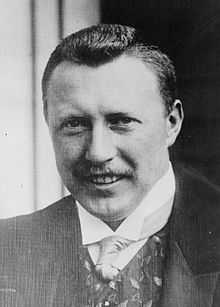Wilhelm Filchner
| Wilhelm Filchner | |
|---|---|
 | |
| Born |
September 13, 1877 Bayreuth, Germany |
| Died |
May 7, 1957 Zurich, Switzerland |
| Citizenship | German |
Wilhelm Filchner (September 13, 1877 – May 7, 1957) was a German explorer.
Early expeditions
At the age of 21, he participated in his first expedition, which led him to Russia. Two years later, he travelled alone and on horseback through the Pamir Mountains, from Osh to Murgabh to the upper Wakhan to Tashkurgan and back. From 1903 to 1905 he led an expedition through Tibet.
Expedition to Antarctica
Following his return from Tibet, he was tasked with organizing a German expedition to map Antarctica. After a training expedition to Spitsbergen, they set off with their ship Deutschland on May 4, 1911. The expedition entered the Weddell Sea and discovered Luitpold Coast and the Filchner-Ronne Ice Shelf, which Filchner had originally named after the German emperor Wilhelm II. They were the first expedition to enter further into Weddell Sea than James Weddell some 80 years before.[1]
The ship overwintered in the pack ice after attempts to set up a base on the ice shelf had failed because of an iceberg calving. It was not until September 1912 that the Deutschland was free again and could return. During its drift in the Weddell Sea ice Filchner investigated the existence of New South Greenland, an alleged coastline seen by Captain Bejamin Morrell in 1823, during a sealing voyage. He found no trace, and concluded that Morrell had seen a mirage.[2]
Later life
Filchner never returned to Antarctica, but went on many journeys through Nepal and Tibet, including a geographic survey of Nepal in 1939.
Adolf Hitler awarded him the German National Prize for Art and Science as an acknowledgement of his achievements in exploration.
In the World War II he was interned in India: 1940 in Patna in the Cottage-Hospital, from 1940 until September 13, 1941 in the Parole Camp in Purandhar and from September 1941 until November 1946 in the Parole Camp in Satara. Later on he lived in Poona in the Maharashtra state of India.
Filchner died at the age of 79 in Zurich, Switzerland.
Works
- Wilhelm Filchner: Life of a Researcher
- Wilhelm Filchner: To the sixth continent (translation by William Barr 1994)
- Wilhelm Filchner: Through East Tibet
- Wilhelm Filchner: Hell and Fever in Nepal
See also
References
- ↑ Howgego, Raymond (2004). Encyclopedia of Exploration (Part 2: 1800 to 1850). Potts Point, NSW, Australia: Hordern House.
- ↑ "Wilhelm Filchner 1877–1957". South-pole.com. Retrieved December 20, 2008.
Further reading
- Turney, Chris (2013), 1912: The Year The World Discovered Antarctica, Text Publishing, Melbourne.
- Murphy, David Thomas. German Exploration of the Polar World: a History, 1870–1940. London, Great Britain and Lincoln, Nebraska: University of Nebraska Press, 2002. xiii, 273 p. ISBN 0-8032-3205-5.
External links
|